How To Clean Dive Gear
Jacques Cousteau, a man who dedicated his life to exploring the Earth's largest natural habitat, described his experiences with the following profound words: "From birth, man carries the weight of gravity on his shoulders. He is bolted to earth. But man has only to sink beneath the surface and he is free."
The excitement and exhilaration felt as you headed off shore to your next dive is often hit with the harsh reality of the return trip that it's now time for the dreaded dive gear cleanup. The thought slips into your mind that maybe, just this once, we'll skip cleaning or delay cleaning your gear. Bad idea!!
To help you protect your investment and keep your gear joining you on adventures for years to come, we've gathered this guide for how to clean scuba gear. It entails tips, tricks and suggestions from the experts to keep you diving into the deep blue safely and for many dives to come.
Importance of Cleaning your Gear
We all know how much time, money and effort is expended so we can pursue that freedom Cousteau describes. Even beyond your investment should be your top consideration of your health and safety, as well as the enjoyment of your dives. Failing to maintain your equipment is a sure way to compromise your safety, investment and pleasure associated with diving. By preparing and maintaining your dive equipment before and after each use, you'll set yourself up for success on the water and create memories that will last a lifetime.
The importance of maintaining your gear should be self evident, however the following are a few specific reasons you will need to clean your gear after each dive:
Corrosion and Rust
Saltwater is corrosive to most metals. After each dive you need to rinse all your equipment with fresh water. Corrosion or rusting will initially lead to a weakening of your dive gear and eventually could result in disintegration.
Saltwater Crystals
Crystals will form as saltwater evaporates on your equipment. These crystals can expand and ultimately break the seal on any watertight surfaces. Failing to rinse your gear with fresh water and letting it dry will likely result in equipment failures.
Debris, Sand and Dirt
Even if you dive in only freshwater, you'll need to clean and rinse your gear. Dirt and debris, as well as algae and microorganisms can lodge in hard to access areas of your equipment.
Bacteria and Mildew
Your saliva contains bacteria, so using a mild soap or scuba cleaner and cleaning thoroughly will help to ensure your gear remains bacteria and mildew free. Completely drying all equipment after cleaning and before storing is critical to maintaining your equipment. Mildew not only causes your gear to smell badly but can discolor, as well as degrade your equipment.
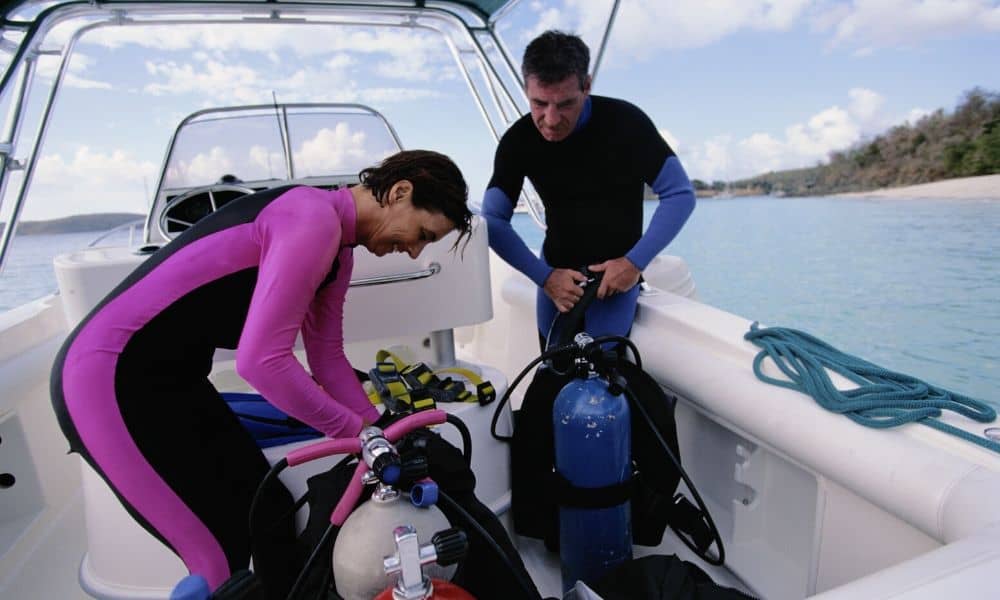
Equipment: Rinse, Clean and Maintain
Every piece of your scuba gear will have special maintenance needs and at the very minimum the following procedures should be taken after every dive:
- Using either a rinse dunk tank or a garden hose, all dive gear should be rinsed off with fresh, clean water.
- Place your gear, preferably in a shaded area to avoid UV damage, allowing it to dry completely.
- Allowing your equipment to dry in sunlight for a short period of time is alright. However, avoid direct sunlight for extended periods of time. Direct sunlight can in time cause your gear (neoprene and rubber) to fade, crack, deteriorate and ultimately fail.
- Before storing your equipment, each item should be inspected to identify any potential problems, so they can be addressed before your next dive.
- Gear should be stored in a well ventilated, dry location, that is not in direct sunlight and avoids UV degradation.
This information should be regarded as the basic minimum for maintaining your equipment. Specific equipment and the steps you should take for each piece of equipment includes:
Wetsuits, Booties and Gloves
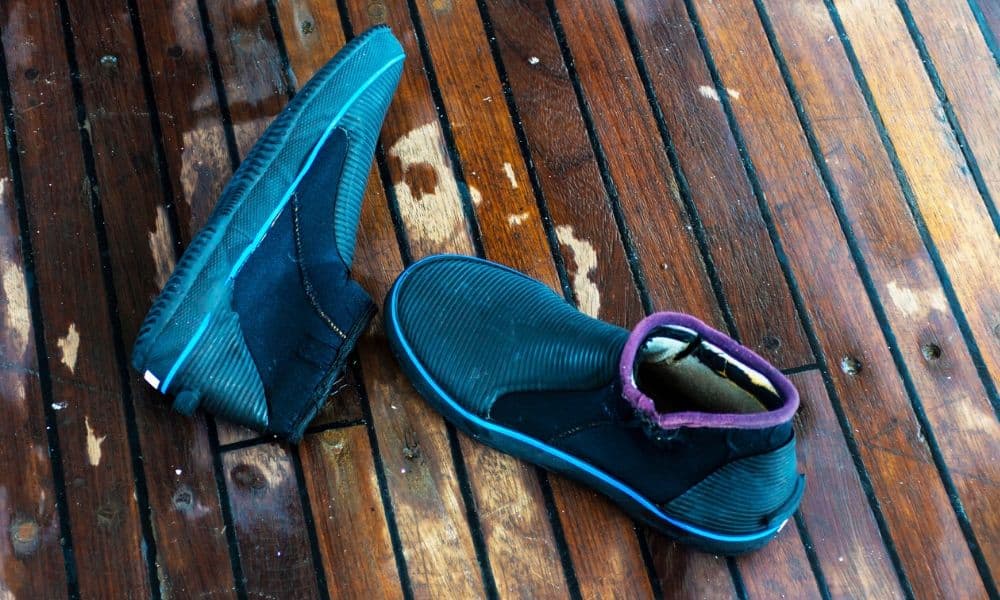
Saltwater causes neoprene, the materials your wetsuits, booties and gloves are made of, to degrade. When neoprene degrades it loses its flexibility.
Your maintenance of these items should include an extended soak in warm water with either a mild dish detergent or wetsuit cleaner. Doing so will not only help to keep this gear clean but also avoid the smell of mildew penetrating your gear. The following steps should be followed:
- Undo all zippers and/or velcro closures.
- Rinse thoroughly.
- Knead the fabric to avoid missing any areas.
- Keep in a cool, dry place, avoiding any direct sunlight.
- Hang your gear, however do not hang wetsuit by the shoulders, instead lay it over a thick hanger (zippers and velcro closures should remain open).
- Follow all manufacturer recommendations for cleaning and storing.
- Do not ever use a washing machine or dryer to clean these items.
Buoyancy Compensation Device (BCD)
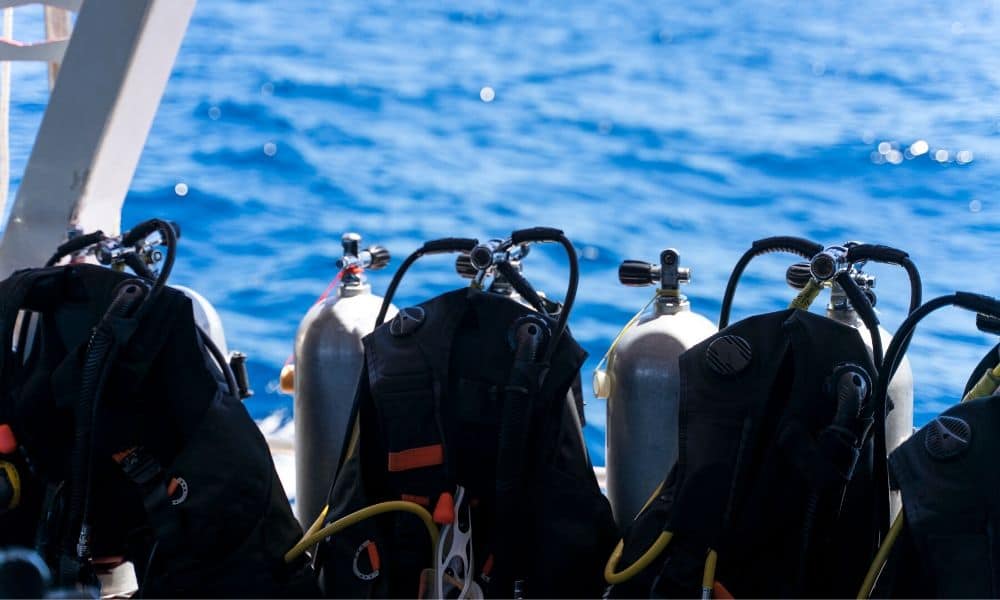
Your BCD should be soaked in a tank of clean, fresh water. You need to ensure that you take care to clean both the inside and the outside of your BCD. A few steps to follow:
- Empty all water that has entered the bladder during your dive.
- Fill with fresh, clean water.
- Inflate your BCD, allowing it to swoosh around inside.
- If there are weight pockets, remove and rinse separately.
- Invert the BCD and hold the inflator at its lowest point.
- Squeeze the bladder removing excess water.
- Repeat until all salt residue has been removed.
- Before storing, inflate to prevent the sides of bladder from sticking together.
- Hang with the hose facing down, to ensure all moisture is drained.
- Store in a cool, dry area out of direct sunlight.
- You may want to lubricate (light coat of wax) zippers.
- Follow all manufacturer directions for cleaning and storing your BCD.
Mask, Snorkel, Fins
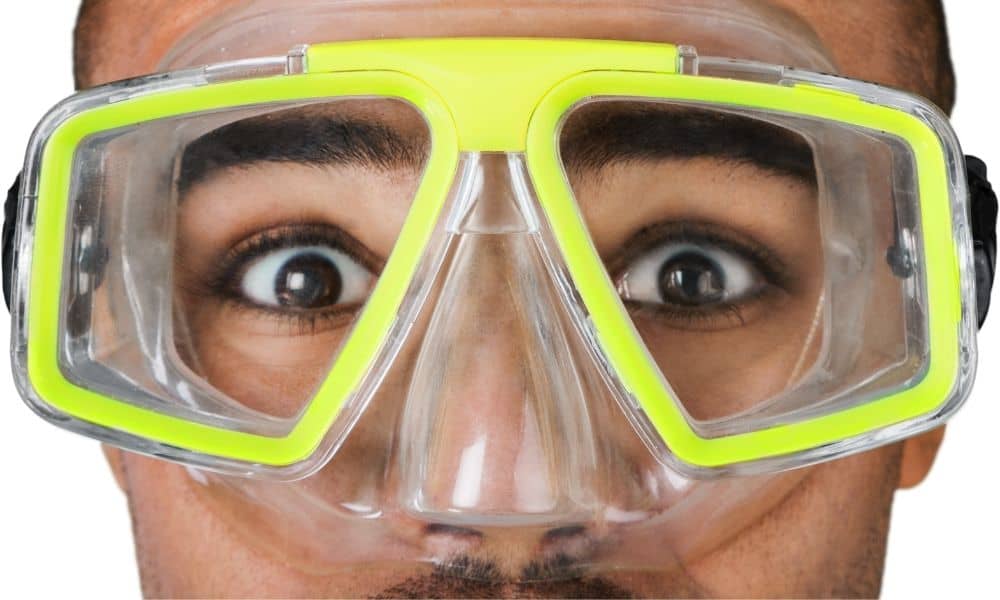
To prevent mildew growth, rinse your mask, snorkel and fins after each dive and allow to dry completely. Always use clean, fresh water. Any adjustable parts should be rinsed then readjusted and rinsed again to remove sand, salt or any debris that may be caught in these areas. A few extras steps that should occur:
- Use a mild soap (baby shampoo works great) to rinse your mask. Bacteria from your saliva can grow on your mask, the soap will help to clean and keep my mask from smelling of mildew.
- Use a soft toothbrush to get in small or tight areas of your gear.
- Sanitize the snorkel mouthpiece in the same manner you do with your regulator mouthpiece.
- Use a towel or clean rag to dry your gear completely before storing.
- Store in a cool and dry place out of direct sunlight.
- Do not stack fins. Lie them down horizontally or hang from straps, so they maintain their original shape.
Dive Computer
Your dive computer has a variety of buttons and grooves that will require additional time to soak ensuring you dislodge and remove any sand, salt or debris that may accumulate in these areas. While you hold your dive computer underwater, press all of the buttons at the same time to flush saltwater from the device.

Regulator
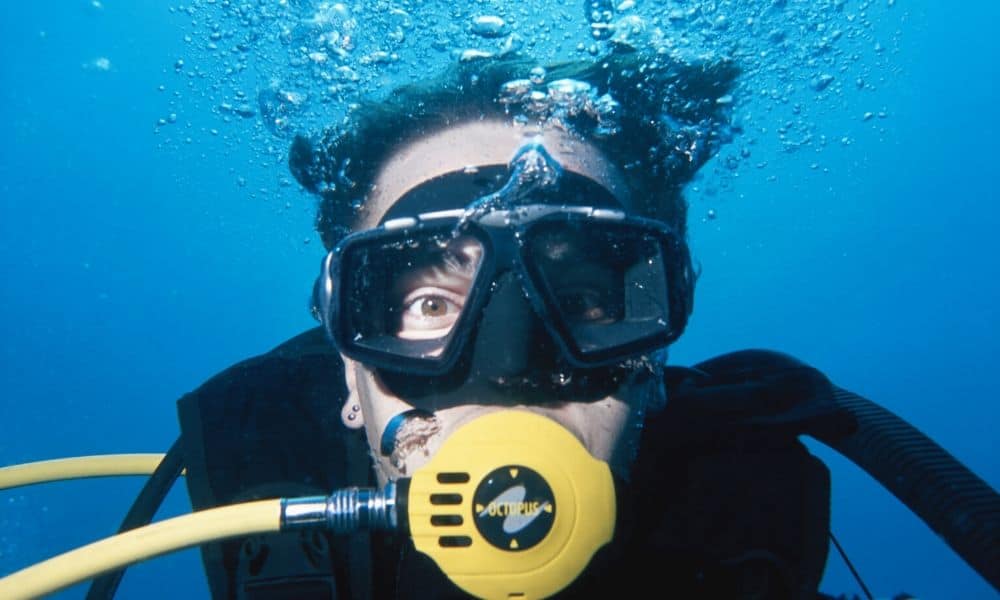
Dry the regulator dust cap and make sure it is clean and secure prior to rinsing the device. Once you've done so, the regulator can be submerged in clean, fresh water. Rotate all moving parts, while submerged to ensure all salt residue is dissolved and removed. A few other considerations include:
- To avoid any growth of bacteria use baby shampoo, alcohol or an antibacterial cleaner to sanitize the mouthpiece.
- Use a soft toothbrush to gently clean the mouthpiece.
- Rinse thoroughly, making sure to NOT press the purge button (you don't ant water creeping into the hose).
- Always allow the regulator to dry completely before storing.
- Store in a cool, dry place away from any sunlight.
- You can also, as a final step, spray silicone conditioner on a towel and wipe down the device.
Scuba Cylinders
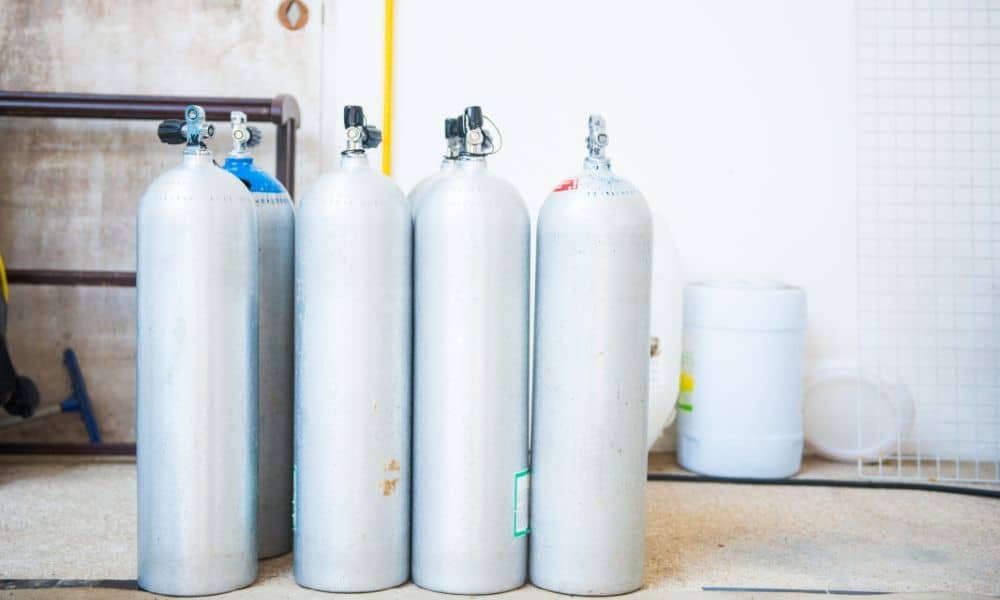
Do not forget your scuba tanks in your cleaning process. They require minor effort to clean but still are important in your maintenance of equipment. As with all your other gear rinse your tank(s) with clean, fresh water. This can be done with your regulator attached and pressurized (we recommend this) or it can be done with the regulator removed, it just requires a little more care. Additionally, make sure to clean the tank knob to remove all sand, salt and grit. If not thoroughly cleaned there will be build up and make turning your air supply on and off more difficult.
Other Equipment: Camera, Dive Knife, etc.
All other equipment, including an underwater camera, dive knife, etc. should be thoroughly soaked and rinsed. You should make sure that all salt residue, sand, grit and debris is removed, especially around any moving parts.

Final Thoughts
The most critical thing to remember about cleaning and maintaining your scuba gear is to ensure your equipment is in the best possible condition, as your safety should be your top priority. The time devoted to properly care of your scuba gear will maintain its quality and increase its lifespan.
Always follow your manufacturer's instructions for proper care and maintenance. Inspect your dive gear before each use and regularly have your equipment professionally serviced. You may also want to consider taking an equipment maintenance course to ensure you know how to properly maintain your gear.
Take care of your diving gear, so your diving gear can take care of you! If you have any additional thoughts or consideration for cleaning your gear please let us know in the comments section.
How To Clean Dive Gear
Source: https://seasideplanet.com/how-to-clean-scuba-gear/
Posted by: wilkersonnotemed.blogspot.com

0 Response to "How To Clean Dive Gear"
Post a Comment